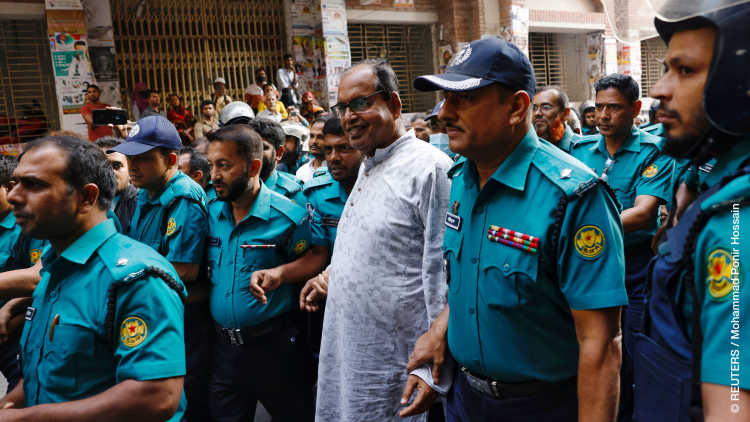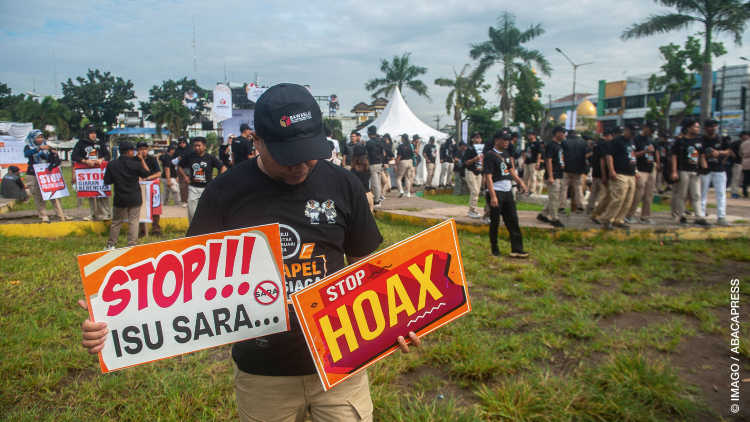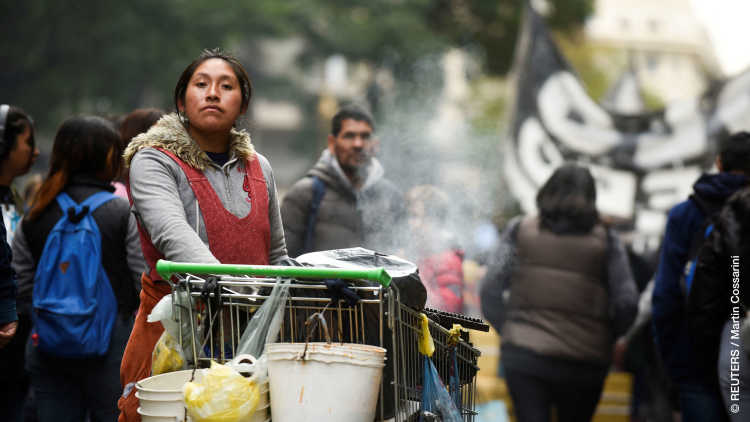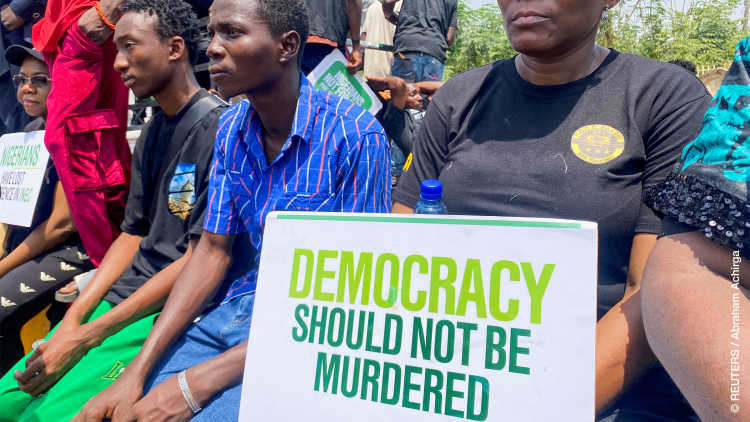- Startseite
- Publikationen
- GIGA Focus
- Bangladesh’s Upcoming Election: A Litmus Test for Democracy
GIGA Focus Asien
Bangladesh’s Upcoming Election: A Litmus Test for Democracy
Nummer 7 | 2023 | ISSN: 1862-359X

Bangladesh is on the precipice of another controversial national election, to be held on 7 January 2024. The last two elections, held in 2014 and 2018, were marred by allegations of electoral fraud but provided resounding victory for Prime Minister Sheikh Hasina’s party. During her 14-year rule, Bangladesh has seen impressive economic growth, yet its democratic standards have declined steeply.
Bangladesh is facing a political stalemate over the administration of the election. The government has rejected the opposition’s demand for the reinstatement of the neutral caretaker government system that had overseen elections between 1991 and 2008. In response, the opposition is boycotting the polls.
Hasina is also under considerable international pressure, especially from the United States, to ensure free, fair, and inclusive elections. However, the government appears determined to administer another one-sided election – which would consolidate Bangladesh’s turn towards authoritarianism.
Popular discontent related to the rising cost of living and economic mismanagement is providing momentum to anti-government sentiment domestically.
Violent confrontations between opposition activists and ruling-party members, especially in the case of a rigged election, could destabilise the country in the post-election period.
Policy Implications
A one-sided election will accelerate Bangladesh’s democratic backsliding, increase its dependence on India and China, and may also incur punitive measures from Western democracies – especially the US. The EU member states should maintain pressure on the Bangladeshi government to create an environment conducive to free and fair elections. At the same time, the EU should also consider how the terms of engagement vis-à-vis Bangladesh may change in the event of a controversial election.
Elections in Bangladesh
Bangladesh’s next general election is scheduled for 7 January 2024. After a pause of several years, mass protests and violent confrontations have returned to the streets of both the capital Dhaka and of other cities elsewhere in the country. The crux of this agitation is the demand of the main opposition faction, the Bangladesh Nationalist Party (BNP), to have the election take place under the erstwhile caretaker government system instead of under the watch of Prime Minister Sheikh Hasina and her ruling Bangladesh Awami League (BAL).
Between 1991 and 2008, general elections in Bangladesh were held under a neutral interim administration, a constitutional arrangement that was put in place to ensure the timely and peaceful transfer of power. This period, despite being violent, was marked by intense competition between the two main political parties who had ruled the country alternately for almost two decades. The last election held under this arrangement, taking place in 2008, provided a landslide victory to the BAL, therewith making Hasina prime minister. She has held that post ever since.
In 2011, the BAL scrapped the constitutional provision on the caretaker government system despite strong criticism of that move by the main opposition party and civil society. The last two general elections under the BAL government, held in 2014 and 2018 respectively, provided sweeping victories for the incumbent but were highly controversial due to allegations of vote rigging and voter manipulation. The BNP boycotted the 2014 elections and secured only seven out of 300 seats in parliament during the 2018 elections. The contentious nature of the last two general elections strengthened the opposition’s long-standing demand for the reinstatement of the neutral administration for the next election. However, Hasina has categorically rejected this demand for years now, saying the matter has been settled constitutionally. Her government is now preparing to hold another controversial election amid violent street protests and a total boycott by the main opposition party and their allies (Bhattacharya 2023).
The evolving conditions on the ground ahead of Bangladesh’s looming national election and the possible implications for both domestic stability and foreign relations hence require close scrutiny. Bangladesh stands on the precipice of a third consecutive one-sided election: the country’s democratic backsliding is likely to accelerate while the reputational risks to Hasina will only grow. Moreover, a non-inclusive election and the absolute consolidation of power could further exacerbate the existing economic vulnerabilities the country is facing while also having adverse implications for its relations with Western democracies.
Authoritarian Overtures
In the last decade, Bangladeshi politics has been radically transformed under Hasina’s leadership. The violent yet competitive democracy prevalent in the 1990s and first decade of the new century has been replaced by an increasingly authoritarian government. Currently in its third consecutive term, this unprecedented and unbroken stint in power has allowed the BAL to establish complete control over Bangladesh’s civic and political spheres. This has been achieved through relying on the police force, the ruling party’s student and youth wings, as well as on a politicised judiciary. Moreover, the politicisation of all domestic institutions has created a culture of impunity for BAL activists while law-enforcement agencies are used as the brute strength needed to silence any form of opposition. Since 2009, each successive tenure of the Hasina government has been marred by allegations of torture to extract confessions, arbitrary arrests, thousands of extrajudicial killings, brutal crackdowns on political opponents, and an alarming increase in the number of forced disappearances. Most of these complaints are lodged against the country’s law-enforcement agencies.
In addition, the government has enacted a series of laws to muzzle dissent and severely restrict freedom of expression. Most notable among these laws, and also the most widely used, is the Digital Security Act (DSA). Introduced in 2018, the Act’s stated aim was to curb religious radicalism, sedition, and pornography. However, its vague provisions – which criminalise disseminating “aggressive and frightening” content or “spreading propaganda” online – have been used to silence different groups of critics including journalists, bloggers, civil society leaders, and human rights activists (Oxford Analytica 2021). A deeply politicised judiciary has further aided the government’s selective targeting of critical voices while eroding the rule of law overall (BTI Transformation Index 2022).
Politically, since 2009 the government has fiercely suppressed its arch political rival the BNP through a multipronged approach combining imprisonment, forced disappearances, extrajudicial killings, and, most notably, bombarding the party’s top and middle leadership with thousands of criminal lawsuits. The BNP claims that the government has lodged as many as 90,000 cases implicating 2.5 million of its activists since that year (Prothom Alo 2023). Most prominent among the accused is BNP’s leader Khaleda Zia, who was jailed for corruption in 2018 but released in 2020 on humanitarian grounds, on the condition that she refrain from travelling abroad. Tarique Rahman, Zia’s son and acting BNP chair, is in exile in the United Kingdom and has been convicted on various charges in absentia. In October 2018, he was sentenced to life imprisonment for his involvement in a 2004 grenade attack targeting a BAL rally, which at the time was in opposition to the Zia-led BNP government.
Renewed Hostilities
Since August 2022, the BNP has organised a series of fresh anti-government protests demanding the resignation of the prime minister and reinstatement of the neutral caretaker government system. The BNP was joined in these rallies by the Ganatantra Mancha (Democracy Platform) – a coalition of seven leftist parties including Nagorik Oiko (Citizen’s Front) and Gana Songhoti Andolan (People’s Unity Movement). In recent months, these countrywide demonstrations have attracted thousands of BNP supporters and reinvigorated its grassroots base despite efforts by the authorities to crack down on opposition supporters and thereby reduce attendance. In response to these anti-government protests, the ruling party’s own supporters have sought to reclaim the streets. Since December 2022, BAL activists have been carrying out “peace rallies” – with them being organised on the same day as the BNP’s anti-government iterations, as a way for the BAL to demonstrate its own popular support.
These year-long opposing street face-offs (that started in October 2022) reached a crescendo on 28 October 2023, when a large political rally – joined by all major opposition parties – was violently dispersed by law-enforcement officers and ruling-party activists. The day-long, three-way violence between the police, government supporters, and opposition activists left one officer dead and thousands injured (Dhaka Tribune 2023). Since then, more than 10,000 opposition leaders and activists have been arrested – including all of its top leaders (Shishir 2023). In response, the opposition has called for multiple rounds of general strikes (hartal in Bengali) and blockades, continuing to do so indeed even after the election schedule was announced. These protest activities have seen a renewal of violence in politics, with around 19 fatalities by late November 2023 (Shishir 2023).
Development over Democracy
In recent years, a key political strategy of Hasina has been to emphasise Bangladesh’s development record and consistent economic successes while brushing aside criticism regarding democratic practices such as freedom of expression, civic liberties, and participatory elections being undermined. The government has championed several large infrastructure schemes, including the recently completed Padma Bridge, as part of Hasina’s “development before democracy” style of governance. Ahead of the election, Hasina has been keen to showcase her government’s development track record and hence inaugurated several such projects – including the Dhaka Elevated Expressway, Dhaka Metro Rail, Karnaphuli River Tunnel, and Chittagong-Cox’s Bazar Railway link – in a bid to appeal to voters.
Apart from the Padma Bridge, however, none of these projects are financed by domestic resources. Bangladesh has relied instead on costly bilateral loans or soft-term credits – mainly from China, India, and Japan – to fund these ventures. Out of Bangladesh’s nine infrastructure mega projects, four are funded/partly funded by Japan, three by China, while India and Russia are funding one each (Rahman 2022). Overall, Bangladesh has been strategic in balancing its bilateral ties with both India and China by only selectively engaging in the latter’s Belt and Road Initiative (Hossain 2018). Yet, several of these financial agreements have higher interest rates and shorter grace periods. Economists estimate that failure to generate substantial revenue in the coming months may undermine the capacity of the Bangladeshi government to meet the repayment schedule for some costly bilateral loans that will kick in from 2024–25 (Jamal 2022).
Economic Troubles
Apart from loan-repayment issues, Bangladesh has been facing a host of other economic challenges fuelling popular discontent with the government. Ordinary people are experiencing increasing hardship because of high energy prices and other cost-of-living pressures. For the last few months, the overall rate of inflation has remained at around 9 per cent while that for food has increased to a 12-year high of 12.5 per cent as of the end of 2023.
At the same time, Bangladesh is grappling with dwindling foreign-exchange reserves, a mounting trade deficit, and the daily depreciation of its currency, the taka. The government is blaming external conditions like the COVID-19 pandemic and the war in Ukraine for the current economic challenges it faces. However, critics point to overall financial mismanagement as the main reason for these adverse circumstances. High-cost infrastructure projects, banking crises, resource wastage in the energy sector, and illicit financial outflows have been identified as contributing to the existing state of affairs (Khatun 2023).
Earlier this year, the IMF approved a 42-month loan programme for Bangladesh. The package comprises about USD 3.3 billion under the Extended Credit Facility and Extended Fund Facility and around USD 1.4 billion under the Resilience and Sustainability Trust (International Monetary Fund 2023). The loan requires Bangladesh to undertake substantial macro-economic policy restructuring measures such as reducing fuel subsidies. Hasina has assured observers that unlike Pakistan or Sri Lanka, the IMF loan was taken not as a “bailout” package but as a measure of financial preparedness. Meanwhile, critics have pointed out that this additional loan will do little to ease the existing strains on the economy unless accountability and sound financial governance are ensured. According to a recent report by the US-based watchdog Global Financial Integrity (2021), between 2009 and 2016 around USD 49.65 billion was laundered out of Bangladesh via trade-based illicit flows.
Apart from macro-economic issues, Bangladesh is also grappling with increasing labour unrest in its profitable ready-made garment (RMG) sector. On 31 October of this year, large-scale workers’ protests erupted after the government declared a new salary scale – with BDT 12,500 (EUR 105) set as the minimum monthly wage. These workers took to the street demanding that the minimum wage be increased to BDT 23,000 (EUR 194) per month instead. According to IndustriALL Bangladesh Council, the national chapter of a global workers’ union, at least four workers have been killed in confrontations with the security forces, including one woman. By mid-November, around 100 RMG workers and trade union leaders had been arrested and another 23,000 sued in 62 court cases (The Daily Star 2023). Bangladesh is one of the largest RMG exporters in the world, with almost 50 per cent of its USD 47 billion exports here going to the EU in 2022–23 (Prothom Alo 2023). Bangladesh could lose its “Generalised Scheme of Preferences” facility from the EU and face other types of trade sanctions by the US if systematic violations of labour rights continue.
Outside Scrutiny
Although Bangladesh’s growing authoritarian overtures went largely under the radar of international actors, the matter started gaining attention in 2021. In May 2023, meanwhile, the U.S. Department of State announced a specific policy targeting Bangladesh in declaring that it would deny visas to those who “obstruct” the election process there. Activities that could be deemed “obstruction” include vote rigging, voter intimidation, electoral violence, as well as restrictions on opposition parties, the press, and civil society. The policy is projected to be applied equally to ruling-party and opposition members, as well as to those from law-enforcement agencies, the judiciary, and the security services.
The BAL’s top leaders maintain that the new US visa policy will have little impact on Bangladesh’s upcoming national election. However, local elections held between May and July 2023 – that is, subsequent to the new policy’s announcement – saw less violence and a relatively higher voter turnout. Many Bangladeshi elites and politicians have familial ties and investments in the US, making this policy a potential lever of influence.
In recent years, Washington has demonstrated its displeasure over Bangladesh’s democratic backsliding and human rights record. In 2021, the US imposed sanctions on Bangladesh’s elite paramilitary force, the Rapid Action Battalion, as well as on seven of its current and former officers due to serious human rights violations. Civil society groups have long called for punitive measures against the force, accusing it of serious abuses including torture, extrajudicial killings, and forced disappearances. The sanctions led to a substantial reduction in extrajudicial killings by Bangladesh’s law-enforcement agencies in the months that followed (Riaz 2023). The US president also refrained from inviting Bangladesh to the Summit for Democracy, both in 2021 and 2023.
In July and October of this year, two exploratory missions from the US and the EU respectively visited Bangladesh to assess election-related preparations. Based on their reports, the US delegation – comprised of representatives from the International Republican Institute and the National Democratic Institute – decided to send a small team of consultants who will assess on-the-ground conditions during the election itself. The EU initially opted for not deploying a full election observer team, citing the absence of necessary on-the-ground conditions and funding shortages. However, the bloc has now decided to send a four-member technical team that will stay in Bangladesh for two months to monitor the election – namely, from 29 November 2023 through 23 January 2024. These specific policies and the renewed interest of major Western democracies in Bangladesh’s domestic politics point to the country’s growing strategic importance in the Indo-Pacific region.
The Path Ahead
Bangladeshi politics stands at an important crossroads. As polling day nears, it is becoming more and more likely that the country is heading towards another one-sided election allowing Prime Minister Hasina’s government a consecutive fourth term in office. Within the region, she enjoys strong support both from India and China – who would prefer Hasina to remain in power. Bangladesh is an important bilateral partner in India’s “Neighbourhood First” policy and has become a key ally in the hostile South Asia region. At the same time, China has been aggressively increasing its trade and development ties with Bangladesh (and other smaller South Asian countries) since 2016 in a bid to grow its own sphere of influence (Riaz 2020). Hasina has successfully maintained close working relations with the two emerging powers while strategically balancing between them amid their own growing rivalry. Beijing and Delhi are, as such, unlikely to officially comment on Bangladesh’s continued democratic backsliding and poor human rights record under Hasina’s rule.
On the other hand, given the Joe Biden administration’s priority on democratic values and human rights, Bangladesh may face punitive measures should yet another one-sided election occur. Although the US has not spelled out the procedure on individual and collective sanctions, it is likely that some form of punitive measures would be taken against members of the ruling party. Such actions may further push Bangladesh towards political and economic dependence on regional powers like India and China.
Considering this scenario, the EU member states should revisit their existing ties with the country and consider how the terms of engagement with the (new) government may change in the aftermath of a controversial election. As one of Bangladesh’s largest trade and development partners, the EU has considerable leverage that can be selectively used as a means of positive engagement with the Hasina regime. At the same time, the EU should continue to bolster the activities of human rights and civil society organisations so that they can operate as pressure groups helping contest an authoritarian regime.
Fußnoten
Literatur
Bhattacharya, Snigdhendu (2023), India Reiterates that Upcoming General Election is Bangladesh’s Domestic Matter, in: The Diplomat, 20 November, accessed 27 November 2023.
BTI Transformation Index (2022), Bangladesh Country Report 2022, accessed 25 November 2023.
Dhaka Tribune (2023), Police Constable Killed in Clash with BNP, 28 October, accessed 2 November 2023.
Global Financial Integrity (2021), Trade-Related Illicit Financial Flows in 134 Developing Countries 2009-2018, 16 December, accessed 14 December 2023.
Hossain, Ishrat (2018), Bangladesh Balances between Big Brothers China and India, in: East Asia Forum, 6 June, accessed 5 December 2023.
International Monetary Fund (2023), IMF Executive Board Approves US$3.3 Billion Under the Extended Credit Facility/Extended Fund Facility and US$1.4 Billion Under the Resilience and Sustainability Facility for Bangladesh, Press Release no. 23/25, accessed 2 December 2023.
Jamal, Iresh (2022), Be Careful with ‘Over-Optimism’ for Megaprojects, in: The Daily Star, 1 June, accessed on 5 December 2023.
Khatun, Fahmida (2023), All that Went Wrong for Bangladesh’s Economy, in: The Daily Star, 11 September, accessed 24 November 2023.
Oxford Analytica (2021), Bangladesh Will Ramp Up Digital Surveillance, Daily Brief, 7 April, Emerald Expert Briefings, accessed 14 December 2023.
Prothom Alo (2023), Concern Over GSP Facilities for Bangladesh in EU Markets, 2 December, accessed 3 December 2023.
Rahman, Sheikh Abidur (2022), Mega Development Projects in Bangladesh: Key Objectives and Stakeholders, India Briefing, 25 April, accessed 26 November 2023.
Riaz, Ali (2023), Bangladesh is at a Tipping Point. Here are the Scenarios for a Contentious Election Season, The Atlantic Council, 17 November, accessed 22 November 2023.
Riaz, Ali (2020), As the Sino-Indian Rivalry Heats Up, Watch Bangladesh Carefully, The Atlantic Council, 2 July, accessed 6 December 2023.
Shishir, Joynal Abedin (2023), BNP, Jamaat Plan ‘Non-Violent Movementʼ to Garner International Support, in: The Business Standard, 26 November, accessed 27 November 2023.
The Daily Star (2023), Minimum Wage Demos: 23,000 RMG Workers Sued Over Unrest, 16 November, accessed 4 December 2023.
Redaktion GIGA Focus Asien
Lektorat GIGA Focus Asien
Forschungsprojekt
Regionalinstitute
Forschungsschwerpunkte
Wie man diesen Artikel zitiert
Hossain, Ishrat (2023), Bangladesh’s Upcoming Election: A Litmus Test for Democracy, GIGA Focus Asien, 7, Hamburg: German Institute for Global and Area Studies (GIGA), https://doi.org/10.57671/gfas-23072
Impressum
Der GIGA Focus ist eine Open-Access-Publikation. Sie kann kostenfrei im Internet gelesen und heruntergeladen werden unter www.giga-hamburg.de/de/publikationen/giga-focus und darf gemäß den Bedingungen der Creative-Commons-Lizenz Attribution-No Derivative Works 3.0 frei vervielfältigt, verbreitet und öffentlich zugänglich gemacht werden. Dies umfasst insbesondere: korrekte Angabe der Erstveröffentlichung als GIGA Focus, keine Bearbeitung oder Kürzung.
Das German Institute for Global and Area Studies (GIGA) – Leibniz-Institut für Globale und Regionale Studien in Hamburg gibt Focus-Reihen zu Afrika, Asien, Lateinamerika, Nahost und zu globalen Fragen heraus. Der GIGA Focus wird vom GIGA redaktionell gestaltet. Die vertretenen Auffassungen stellen die der Autorinnen und Autoren und nicht unbedingt die des Instituts dar. Die Verfassenden sind für den Inhalt ihrer Beiträge verantwortlich. Irrtümer und Auslassungen bleiben vorbehalten. Das GIGA und die Autorinnen und Autoren haften nicht für Richtigkeit und Vollständigkeit oder für Konsequenzen, die sich aus der Nutzung der bereitgestellten Informationen ergeben.

















